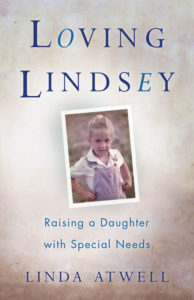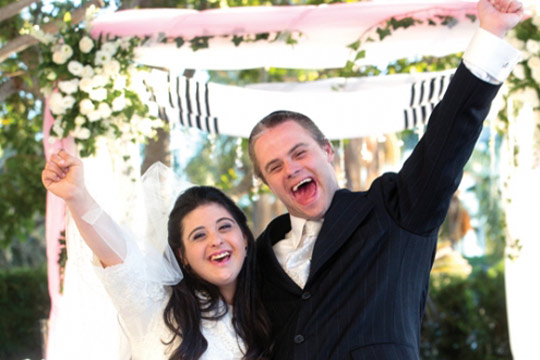I was sitting in a downtown Portland, McMenamins, chatting with a friend about my daughter’s recent meltdown and her upcoming wedding. Between sips of iced tea, my friend–a woman who had never met Lindsey–asked, “How can two special needs people marry?” Concern and curiosity tinged her tone. My immediate, defensive response: “They’ll walk down the aisle and say I do.”
But I knew that wasn’t what she meant. She meant, should they marry? Do they have the capabilities to care for one another? Can they manage (emotionally) the responsibilities and difficulties of married life?
All these questions and concerns are valid. Many people are curious about my thirty-two year old daughter and her thirty-four year old fiancé. They worry that these two special adults may lack common sense–not necessarily for average day-to-day scenarios–but for high-stress events or emergencies. And for people with special needs, those events could happen daily. Or they may never occur. So do we forbid our young adults from living as normal a life as possible–just in case the unexpected happens? Or do we try and teach them how to better handle these situations?
I’ve met parents who don’t feel that their special needs child should date, marry, or live apart from them–ever. They prefer to care for their child, never let them out of their sight. And this may be the right decision for that family. But I’ve wondered, do these parents worry who will care for their adult children when they are no longer able?
Years ago, Lindsey wanted to live in her own apartment and we decided to give independent life a try. The cynic could certainly say, “Yeah, and look what happened.” My daughter willingly ran away with a man twenty-two years older. For four years, he isolated her from family and friends. She went along with the isolation. It was an ugly time. And painful for us. We couldn’t control her actions; we couldn’t force her to come home.
The problem is, whether or not your child is mentally challenged or mentally healthy, if you give him/her the gift of independence, you won’t always agree with the decisions they make. When Lindsey returned home, we were there to help pick up the pieces. We were there to guide her, to help her make better choices–so hopefully, there would never, ever be a next time.
Now my daughter wants to marry. Later this month, Lindsey and Nick will commit their love to one another. Lindsey works a part-time job. Nick drives a car. Lindsey doesn’t manage money well; Nick is learning to write checks. Lindsey can’t cook elaborate meals, but she brags, “I sure got the cleaning gene.” Nick hates to clean, but according to Lindsey, “He cooks pot roast like a TV chef.” Lindsey has two cats: Cuddles and Sally. Nick has a bird. They both have parents and extended family who will remain supportive and offer advice. We all want to believe this union will work.
As parents, we hope Lindsey and Nick will keep each other company (which may reduce the four to eight phone calls I receive every day.) Together, we hope they gain confidence, make wiser (and more independent) “couple” decisions. Maybe Nick will teach Lindsey to cook. Maybe Lindsey will instill her “clean gene” in Nick. They may have to compromise on spending money. But they will start depending on someone other than us. And when all this parental support is gone, they will still have each other. We hope they grow old together.
My cousin, Eric, and his wife, Lori, inspire me. Although both have mental and/or physical challenges, they married and have made decades of memories. They ride the city bus, are members of a church; they like to go on cruises. I’ve watched their relationship grow. Lori cared for Eric when he recovered from surgery. Eric helped Lori host a housewarming party when they moved into a new place. Do they experience bad days? Sure. Even the best marriages have them. But Eric and Lori have loved and supported each other for over thirty years. I want that for my daughter too.
So how can two special needs people marry? My answer is still the same. They will walk down the aisle and say I do. I’m sure there are individuals with mental disabilities and challenges who shouldn’t make such a commitment. But no individual or couple should be lumped into one specific group. The decision to form a marriage, a partnership, should be left up to the “special” couple and the people who support them.
 My first book, Loving Lindsey: Raising a Daughter with Special Needs will be out September 26, 2017. If you would like to learn more, click here.
My first book, Loving Lindsey: Raising a Daughter with Special Needs will be out September 26, 2017. If you would like to learn more, click here.
 Do you know any successful mentally challenged married couples/or ones in committed relationships? If so, please share what makes their relationship work. I’d like to pass that advice onto my daughter. And if your special needs adult wanted to marry, but you’ve decided not to encourage, support, or allow it, I’d love to hear why? There are no right or wrong answers–just different ones.
Do you know any successful mentally challenged married couples/or ones in committed relationships? If so, please share what makes their relationship work. I’d like to pass that advice onto my daughter. And if your special needs adult wanted to marry, but you’ve decided not to encourage, support, or allow it, I’d love to hear why? There are no right or wrong answers–just different ones.
Goodwill helps people earn a living, improve their lives, and strengthen their families and their communities. I chose to recognize Goodwill this month because Lindsey worked there for two years and it boosted her confidence and customer service skills. Goodwill depends upon donations. If you need to clean out your closets and find some goods to give, consider this organization. It helps millions of people every single year. But remember to make your donation before December 31, 2012–it’s tax deductible!

